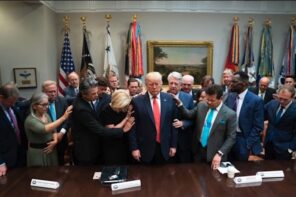Evangelicals befuddled observers with their enthusiastic support for Donald Trump, despite his shocking disregard for the “traditional family values” that have been the religious right’s rallying cry for decades. Trump’s choice of Betsy DeVos for Secretary of the Department of Education is a profound example of why they did so; it has (always) been all about power, not piety.
As Trump announces his executive appointments we see more clearly how the various factions of his coalition will shape policy in the coming years, and do so in ways that promote the political agenda of the religious right. Certainly, this will include court appointments likely to roll back reproductive rights, and various other appointees who will promote the primacy of evangelical Christianity both domestically and globally.
Education is arguably the most important front in the battle to bring the Kingdom of God to bear on contemporary culture. For the religious right, this means promoting alternatives to public schools including Christian schools, charter schools, and home schooling, with the longstanding goal of replacing the public education system with private Christian education. I wrote about the efforts back in a 2012 essay here on RD but those efforts date as far back as the 1960s and the work of R.J. Rushdoony.
Framed as “school choice,” vouchers, charter schools, and tuition tax credit plans serve this goal by shifting public funds toward religious schools with little to no accountability to the public. In Building God’s Kingdom: Inside the World of Christian Reconstruction I wrote about one such school in Florida that teaches creationism, dominionism, women’s submission, and so forth, with public money.
Opposition to public education for the religious right is rooted in a worldview in which education is solely the responsibility of families (and explicitly not the civil government), and in which there are no religiously neutral spheres of influence. There is no secular sphere that can function as a neutral space; only the Kingdom of God, and “the world” to be influenced by Christians for the Kingdom. (For our religion nerds this is Van Til and Kuyper, key architects of the Reformed tradition from which DeVos comes.) These views were popularized in the work of Rushdoony and the Christian Reconstructionists and became dominant in the religious right, which is not to say that everyone who holds them is a Christian Reconstructionist.
Indeed, while sharing theological foundations with Reconstructionists in the Reformed Tradition, DeVos comes from a broader conservative evangelical world. She supported John Kasich in the Republican primaries, for example. She has been a member and elder at a mainstream evangelical non-denominational church, and she enjoys support from Rev. Robert Sirico of the Acton Institute and Richard Mouw, former President of Fuller Seminary, neither of whom could be described as Reconstructionists. Sirico is decidedly libertarian without the theocratic influence of Reconstructionists, and Mouw has often been considered a progressive evangelical.
But it’s a mistake to think of these distinct movements with hard boundaries that prevent cross fertilization, particularly since Christian education as a replacement for public education is a place where this happens.
In a 2002 interview at “The Gathering,” for Conservative Christian philanthropists, Betsy DeVos and her husband, future candidate for Governor of Michigan, Richard DeVos, are clear that their charitable work is motivated by a desire to “confront the culture in which we live today to help advance God’s Kingdom.” And of course their track record is instructive, as they have focused on privatization and (mostly Christian) “choice.”
When asked: “Are you anti-public schools?” Betsy replied ambiguously: “We are for good education and for having every child have an opportunity for a good education.” She spoke about competition and fundamentally changing education but never asserted support for public schools. In fact, she drew a distinction between public education (educating the public) and what she called “government run schools” a distinction framed in language often found in Reconstructionist work.
Betsy DeVos has no training, background, experience, or expertise as an educator. Her singular qualification for this post is her longstanding work to privatize public education, a goal driven by her religious views that do not allow for a secular public sphere; views that divide the world into “The Kingdom of God” and every one else.





